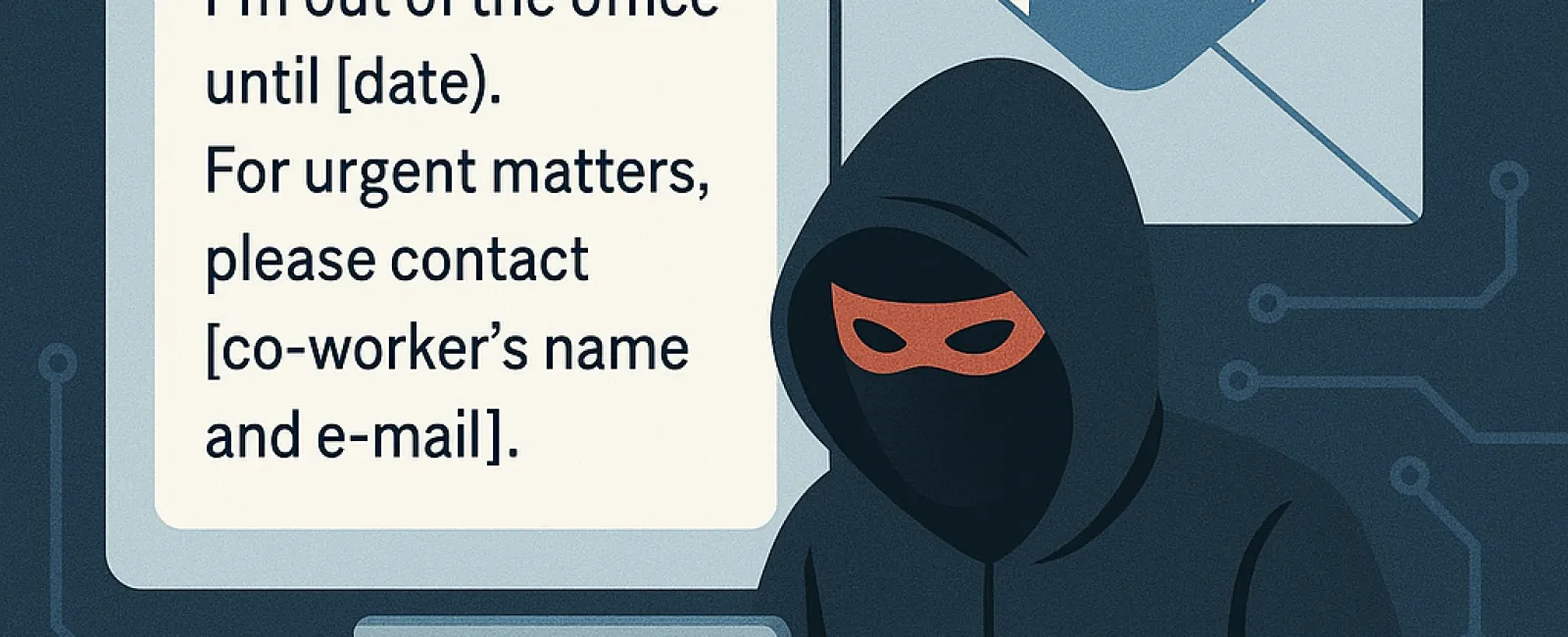June 16, 2025
You set it and forget it. Then, while you're packing for vacation, your inbox automatically sends out this message:
"Hi there! I'm out of the office until [date]. For urgent matters, please contact [coworker's name and email]."
It sounds harmless—maybe even convenient. But this is exactly what cybercriminals are waiting for.
Your automatic reply, meant to keep things running smoothly, can actually provide hackers with valuable information for an easy way in.
A Typical Out-Of-Office (OOO) Message
- Your name and job title
- The dates you're away
- Alternate contacts and their email addresses
- Internal team structure
- Even details about your whereabouts ("I'm at a conference in Chicago…")
This information gives cybercriminals two key advantages:
1. Timing: They know you're unavailable and less likely to notice suspicious activity.
2. Targeting: They know exactly who to impersonate and who to target with scams.
This creates the perfect setup for a phishing or business email compromise (BEC) attack.
How the Scam Usually Unfolds:
1. Your auto-reply is sent.
2. A hacker uses it to impersonate you or your listed backup contact.
3. They send a fake "urgent" email requesting wire transfers, passwords, or sensitive documents.
4. Your coworker, caught off guard, assumes the request is legitimate.
5. You return to find that thousands of dollars have been sent to a fraudulent "vendor."
This kind of scenario happens more often than you might think, especially in companies where employees travel frequently. When someone else—like an assistant or office admin—handles communication during these times, cybercriminals have the perfect opening:
- The admin juggles emails from multiple people.
- They are used to processing payments and sensitive requests.
- They work quickly and trust that requests appear legitimate.
Just one well-crafted fake email can lead to costly breaches or fraud.
How to Protect Your Business from Auto-Reply Exploits
You don't need to stop using out-of-office replies entirely—instead, use them wisely and add safeguards:
1. Keep It Vague
Avoid sharing detailed schedules or naming who's covering for you unless absolutely necessary.
Example: "I'm currently out of the office and will respond when I return. For immediate assistance, please contact our main office at [main contact info]."
2. Train Your Team
Make sure everyone understands:
- Never act on urgent money or sensitive info requests based solely on email.
- Always verify unusual requests through a different channel, like a phone call.
3. Use Email Security Tools
Employ advanced filters, anti-spoofing technology, and domain protection to reduce impersonation risks.
4. Enable Multifactor Authentication (MFA)
Require MFA on all email accounts to block unauthorized access—even if passwords are compromised.
5. Partner with an IT Security Expert
Work with a proactive IT team that monitors for suspicious logins, phishing attempts, and unusual behavior before damage occurs.
Ready to Take a Vacation Without Becoming a Cybercriminal's Next Target?
We help businesses build cybersecurity systems that keep you secure—even when your team is out of the office.
Click here or call us at (210) 582-5814 to book your Discovery Call
We'll
check your systems for vulnerabilities and show you how to lock down the risks,
so you can actually enjoy that vacation without worrying about your inbox
betraying you.




